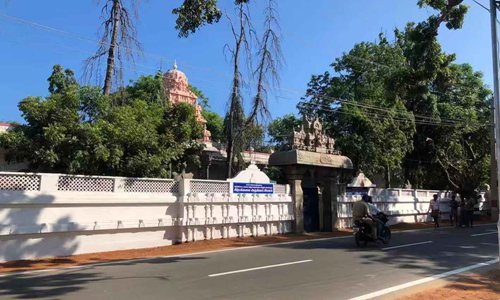Xi-Modi informal summit lends personal touch to diplomacy: analysts
Informal meet lends personal touch to diplomacy

Security beefed up ahead of the summit between Chinese President Xi Jinping and Indian Prime Minister Narendra Modi. The summit is scheduled on Friday and Saturday in the ancient town of Mamallapuram in southeastern India. Photos: Cao Siqi/GT
The ancient town of Mamallapuram in southeastern India is beefing up its security and all set for a makeover for an informal summit between Chinese President Xi Jinping and Indian Prime Minister Narendra Modi scheduled to take place in the next two days.
According to The Times of India, some 10,000 police officers are on call and the Tamil Nadu state government has enlisted nine Indian Administrative Service officers and 34 senior officers as "nodal and coordinating officers" for the summit.
When the Global Times reporter entered the town by private car, police officers set checkpoints and asked the driver detailed questions. 10 police officers were still on duty at midnight.
An insider told the reporter that some Tibetan secessionists have dived to the town and may plan some sabotages. The Hindu reported Wednesday that 10 Tibetans were arrested for planning protests, including a writer, an associate professor and other activists.
Security equipment was installed at hotels. A waitress from a hotel nearby the town's UNESCO World Heritage site Shore Temple told the Global Times that for security, the government has deployed five to six police officers at the hotel.
Police cars patrolled the roads and foreigners were seen being asked to show their identity cards.
A resident told the Global Times that to prepare for the summit, they were granted a three-day holiday.
Some of them shared the happiness that the summit brought the ancient coastal town a chance to get a facelift.
They said Mamallapuram's monuments were renovated and public facilities were given a fresh coat of paint.
The Global Times also observed that the heritage site was covered with new lawns and trees nearby were brushed with white paint.
Lights were hung at the gate of the Shore Temple. Sanitation workers from neighboring towns and municipalities had also been arranged to clean up the town.
Local media also mentioned a short history that another Chinese leader has once came to Chennai and Mamallapuram. It said in December 1956, Zhou Enlai, the first premier of the People's Republic of China had toured Mamallapuram and visited the Integral Coach Factory and praised the factory as "a modern coach factory" and said it was worthwhile for his countrymen to visit and learn from the factory.
Mamallapuram is a town on a strip of land between the Bay of Bengal and the Great Salt Lake in the south Indian state of Tamil Nadu.
The city, also known as Seven Pagodas, is about 50 kilometers from the state capital Chennai, formerly known as Madras.
Mamallapuram is known for its temples and monuments built by the Pallava dynasty in the seventh and eighth centuries.
Mamallapuram has more than 1,700 years of historical defense and trade ties with China.

Cit view of Mamallapuram in southeastern India Photo: Cao Siqi/GT
For about eight centuries, Mamallapuram flourished as a business hub in the Bay of Bengal and a gateway for exports and imports from China to Tamil Nadu, said Satyendra Kumar Upadhyay, director of international relations at the Mumbai-based Somaiya Vidyavihar University.
"The agreement between Chinese rulers and Pallava King Raja Simhan II or Narasimhavarman II during the early eighth century was the first strategic security pact between two kingdoms," he said.
There are about 12 to 15 Chinese companies operating in Tamil Nadu now but the number is expected to increase, Satyendra noted.
Chennai has attracted Chinese manufacturers including Lenovo and Huawei.
There is a growing interest among Chinese companies to invest in India especially under the "Make in India" initiative, as labor costs are relatively cheaper than in China.
They foresee opportunities in the growing cooperation in the combination of Chinese technology and Indian manufacturing.
Indian entrepreneurs say they are full of expectations from the summit as a boost for business confidence.
"Dialogue and cooperation are conducive to eliminating misunderstandings and differences," said Naresh Kumar Rawal, managing director of Olectra Greentech Technology Company, an Indian electric vehicle manufacturer.
"This meeting will inspire entrepreneurs from both countries to further deepen bilateral cooperation," he told the Global Times.
In 2015, Olectra Green Technology and China's electric vehicle manufacturer BYD forged a partnership.
The two companies jointly set up a factory to design and manufacture electric buses in Hyderabad, India.
New arenas of cooperation
Indian scholars believe the summit will help establish strategic communication between the two leaders, build consensus on certain issues and give overall direction to bilateral relations.
The Wuhan informal summit marked the rebalancing of India-China relations in an atmosphere that was tense and dangerous in the wake of the Doklam military border standoff.
Modi was the only foreign dignitary received by President Xi first in Xi'an, Northwest China's Shaanxi Province and then in Wuhan, a departure from protocol as both leaders lend a personal touch to diplomacy, said Bali Ram Deepak, director of the Centre for Chinese and Southeast Asian Studies at Jawaharlal Nehru University in New Delhi.
"Inviting President Xi for another summit in India is an indication that both sides have formalized these informal summits," Deepak told the Global Times.
The informal summit assures that the leaders get enough space for one-on-one discussions so as both get to know and understand each other better, he said, noting that it was not limited to discussing bilateral issues alone, but also the overall, long-term and strategic issues concerning the future development of India-China relations, providing them correct direction, setting new goals and opening new arenas of cooperation.
Ding Xuezhen contributed to this story
Newspaper headline: India prepares for Xi visit